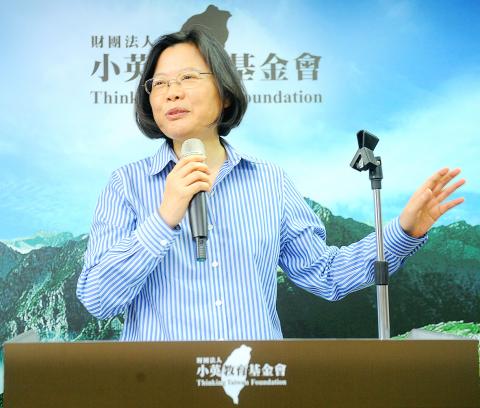Former Democratic Progressive Party (DPP) chairperson Tsai Ing-wen (蔡英文) yesterday officially announced the establishment of her foundation, the Thinking Taiwan Foundation, an organization which aims to develop charity projects and public policy.
“While it takes piles of cash to fill up a room, you can light up a room with a match. And that is what we’re trying to do,” said Tsai, who will chair the foundation, at the opening ceremony.
The foundation aimed to light three matches for Taiwan — deliberation and discussion of public policy, action to show compassion to local communities and acting as a catalyst for social action through participation, Tsai said of her first major move after losing the January presidential election.

Photo: Wang Min-wei, Taipei Times
“The ultimate goal would be to further the power of thinking, the power of action and the power of society,” said Tsai, whom many supporters expect to make another run for president in 2016.
Public policy is important because it would determine Taiwan’s future, which is bleak in many people’s eyes at present, she said.
Her foundation is determined to commit to charity works because over the years she has seen so many ordinary citizens and organizations get involved to help society move forward, she added.
The two primary goals are all about the people, she said.
“The most beautiful thing about Taiwan is its people. Without these passionate and sincere people, Taiwan would be a hollow place,” she said.
That was also why Tsai intended to make the foundation, which is funded from the NT$120 million (US$4 million) election subsidy Tsai received, free from political ideology and partisanship.
Among the board members of the foundation are former DPP secretary-general Su Jia-chyuan (蘇嘉全), Tsai’s running mate in the presidential election; former Chunghwa Telecom chairman Hochen Tan (賀陳旦); former deputy chairman of the Council for Economic Planning and Development Chang Ching-sen (張景森); journalist Antonio Chiang (江春男); and political commentator Yao Li-ming (姚立明).
Former finance minister Lin Chuan (林全) will serve as the foundation’s chief executive director.
The “Thinking Taiwan Forum” Web site, which was launched on Sunday, will play an integral part of public policy and social issues deliberation, Lin said.
The Web site will publish articles written by young professionals, academics, activists and prominent writers in six broad categories: including democracy, law, China affairs, economic affairs, society and culture.
The foundation also plans to hold open and closed-door conferences and workshops on various topics, Lin said.
According to Lin, the first closed-door conference on Taiwan’s future economic development model is scheduled to be held on Aug. 14 and Aug. 15. The conference will have panel discussions on macroeconomics, cross-strait economy, global economy, governance and a general discussion.
While the foundation will try to avoid political influence, Tsai will not shy from making political comments as a politician and a former presidential candidate, Lin said.
Tsai’s political affairs will be handled by her office, rather than the foundation, Lin said.

Three Taiwanese airlines have prohibited passengers from packing Bluetooth earbuds and their charger cases in checked luggage. EVA Air and Uni Air said that Bluetooth earbuds and charger cases are categorized as portable electronic devices, which should be switched off if they are placed in checked luggage based on international aviation safety regulations. They must not be in standby or sleep mode. However, as charging would continue when earbuds are placed in the charger cases, which would contravene international aviation regulations, their cases must be carried as hand luggage, they said. Tigerair Taiwan said that earbud charger cases are equipped

Foreign travelers entering Taiwan on a short layover via Taiwan Taoyuan International Airport are receiving NT$600 gift vouchers from yesterday, the Tourism Administration said, adding that it hopes the incentive would boost tourism consumption at the airport. The program, which allows travelers holding non-Taiwan passports who enter the country during a layover of up to 24 hours to claim a voucher, aims to promote attractions at the airport, the agency said in a statement on Friday. To participate, travelers must sign up on the campaign Web site, the agency said. They can then present their passport and boarding pass for their connecting international

UNILATERAL MOVES: Officials have raised concerns that Beijing could try to exert economic control over Kinmen in a key development plan next year The Civil Aviation Administration (CAA) yesterday said that China has so far failed to provide any information about a new airport expected to open next year that is less than 10km from a Taiwanese airport, raising flight safety concerns. Xiamen Xiangan International Airport is only about 3km at its closest point from the islands in Kinmen County — the scene of on-off fighting during the Cold War — and construction work can be seen and heard clearly from the Taiwan side. In a written statement sent to Reuters, the CAA said that airports close to each other need detailed advanced

WEATHER Typhoon forming: CWA A tropical depression is expected to form into a typhoon as early as today, the Central Weather Administration (CWA) said yesterday, adding that the storm’s path remains uncertain. Before the weekend, it would move toward the Philippines, the agency said. Some time around Monday next week, it might reach a turning point, either veering north toward waters east of Taiwan or continuing westward across the Philippines, the CWA said. Meanwhile, the eye of Typhoon Kalmaegi was 1,310km south-southeast of Oluanpi (鵝鑾鼻), Taiwan’s southernmost point, as of 2am yesterday, it said. The storm is forecast to move through central